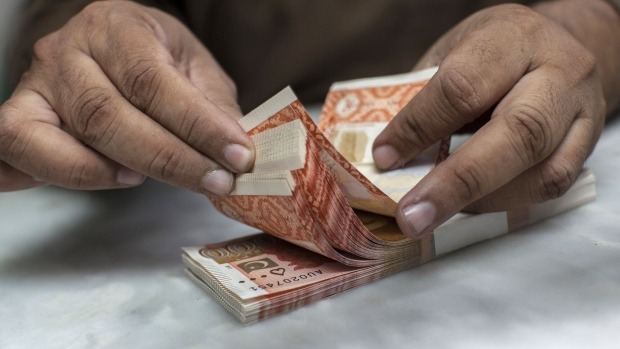Washington April 18 2024: Pakistan’s new government does not anticipate any significant currency devaluation as part of its negotiations with the International Monetary Fund to unlock billions of dollars in lending and bolster the nation’s economic reform agenda.
Finance Minister Muhammad Aurangzeb said there’d be no reason for the rupee to depreciate more than the range of about 6% to 8% seen in a typical year. Pakistan last devalued its currency in January 2023.
While massive devaluations have accompanied some of Pakistan’s previous IMF loans and are often a condition of the crisis lender’s programs around the world, nothing comparable should be necessary this time around, he added in an interview on the sidelines of the IMF and World Bank spring meetings in Washington.
“I don’t see the need for any step change,” Aurangzeb said Wednesday, citing solid foreign-exchange reserves, a stable currency, rising remittances and steady exports. “The only thing which can be a wild card, although in our projections we should be OK, is the oil price.”
Aurangzeb, 59, said the new government in Islamabad was looking to bolster industries including agriculture and information technology with support that it hopes will help push the nation’s growth above 4% in the coming years.
In its talks with the IMF, Pakistan plans to seek a traditional IMF loan through the institution’s so-called extended fund facility. It also wants to get money via the IMF’s new Resilience and Sustainability Trust, which intends to strengthen low-income and vulnerable countries against external shocks like the floods that devastated Pakistan in 2022.
One of the new government’s tasks will be to steer the country out of a high-inflation and low-growth pattern. It faces $24 billion in external financing needs in the fiscal year starting July, about three times its reserves.
Pakistan expects an IMF mission to visit in May and would like to reach a staff-level agreement on its next loan by the end of June or early July, Aurangzeb said, without specifying how much the nation was seeking. Bloomberg News earlier reported that the nation plans to ask for at least $6 billion.
Securing a new deal may also boost Pakistan’s dollar bonds and stock market, which have handed investors one of the best gains globally since the nation began the current IMF loan last July. The IMF executive board is expected to approve the final disbursement from the nation’s existing $3 billion loan this month.
Pakistan recently repaid a $1 billion overseas bond after it closely averted a default on its debt last year.
Key objectives in the loan negotiations will include broadening the tax base, improving debt sustainability and restoring viability to the energy sector, the IMF said last month. These are steps that Pakistan has avoided for decades because of their unpopularity among a nation of more than 250 million people, where the military remains a formidable presence.
Prime Minister Shehbaz Sharif’s pick of Aurangzeb, a former executive at JPMorgan Chase & Co. and Wharton School graduate, marked a shift to using technocrats to steer the cash-strapped economy and negotiate new loans from the IMF. He took on the job last month as Pakistan faced record-high economic pessimism, according to polling by Gallup.
Pakistan in recent years increased tax revenue and energy prices to meet IMF demands, though it hasn’t been able to make progress on long-term structural issues such as privatizing state-owned companies.











